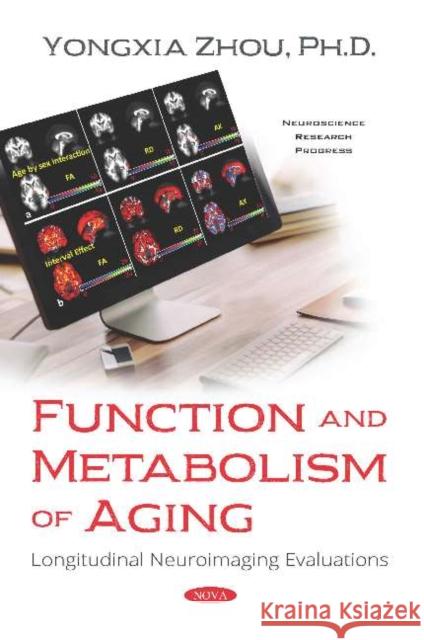Function and Metabolism of Aging: Longitudinal Neuroimaging Evaluations » książka
Function and Metabolism of Aging: Longitudinal Neuroimaging Evaluations
ISBN-13: 9781536156133 / Angielski
Maintaining good metabolic profile plays a significant role in improving the quality of life at aging. Widely recommended physical and psychological strategies include exercise, calorie restriction (such as healthy diet), anti-aging neuroprotective and anti-inflammation therapy. Most occurring risks at middle age range (45-65 years old) are obesity, insulin resistance, inflammation, alteration in the hypothalamus-hypophysis suprarenal axis activity, stress and hypertension that could increase the prevalence of metabolic syndrome. Metabolic syndrome increases with age, particularly for women. Significant associations were seen between imaging measures and cardiovascular risk factors at both baseline and 18-month follow-ups. Both baseline and longitudinal imaging analysis and correlations with neurocogntive tests as well as cardiovascular risk factors could provide distinct and confirmative perspectives relating to the pathophysiology of aging-related diseases such as dementia and diabetes. Significant baseline and longitudinal effects of age, smoking and neuropathological burdens such as amyloid, tau and glucose metabolism provide a complete imaging, neurocognitive and cardiovascular profile for better staging and differentiating different diseases. Together with accurate imaging guidance, early detection and treatment could be achieved with the ultimate goal of improving quality of life at middle age and extending longevity. The aim of this book is intended to provide both beginners and experts in biomedical imaging and health care a broad picture as well as new development in brain function and metabolism of aging using innovative neuroimaging techniques and advanced longitudinal /correlational analyses. Methods and data presented in this book with novel experimental designs and protocols, especially longitudinal investigation of multiple imaging metrics from microvascular, micro-structural to systematic functional, metabolic and neuropathological perspectives will help improving diagnosis and early prevention of common diseases at middle age such as metabolic syndrome and early dementia. Some promising prevention strategies such as arts therapy, aerobic exercise and calorie restriction will be introduced additionally with imaging evidence. Results presented will help improving diagnosis accuracy, staging, and determining phases and trajectories of disease progression with age, endothelial dysfunction and deficits in metabolic syndrome. This book will provide the current state-of-the-art and new frontiers of brain function and metabolic changes at age using multi-parametric functional, structural and molecular imaging techniques in detection, diagnosis and treatment. We will present some forefront and interesting multi-dimensional baseline and longitudinal imaging techniques to serve as a reference and resource book in neuroimaging application and research field. Several distinct detection and application perspectives, including cutting-edge imaging methods from baseline evaluations to longitudinal applications as well as multi-modal and multi-parametric quantifications will be described. The relatively new and advanced data and results together with interesting examples and application demonstrations could help facilitate the generalisation, interpretation and applications of these techniques to improve disease diagnosis, quality of life and treatment for metabolic syndrome and brain dysfunction.











